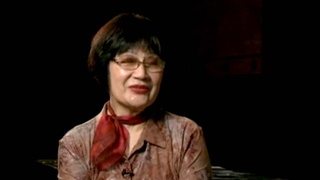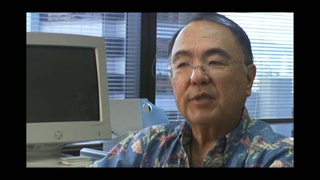Interviews
Life Philosophy
You know, almost 50 years in business since I came up to America. I found a lot of things, I made mistakes. I made something good success, too, but a lot of mistake, too.
So I kinda think back to look at it, and I tell my son, too, but my life is...all my life, I try to be honest, my best policy. I try not to cheat the people, just stay honest, then working straight and working hard, try to do it. That's what I, my philosophy to keep my life. So I want you to do the same way because in the meantime, in the last 50 year time, someone screw me up then, lied to me, they cheat me, someone I lost big money. But that was my fault because I didn't know better to protect myself. Use your future you couldn't get cheated, but you don't want be cheated the people. Stay honest.
That's the best policy I could tell you because even I lost a lot of money but I still comfortable. I don't shame to nobody, I don't owe nobody. I pay all the tax and everything. Nothing wrong, nothing shame of it. So that's the best comfortable life, right? Enjoying now.
So except my health, that's can't help, but as long as you keep up with good health and honest life, this is the best thing to do. So don't be dishonest person. Stay in the life, clear as possible than dishonest. Stay working, continue to work on job. That way don't look for too many things. That's what I thought.
That's what I like to be all young people, too because same, everybody think all business to stick on it. Then try to be honest, peaceful the life is the whole world gonna be. I think why not. But people try to be too success quicker, or try to be more successful, more money, more enjoyment, always looking for...that's where get in trouble is. Just stay in the own pace and comfortable pace and working continue, this is what to me is the best life. I don't know may be some other better way, but I didn't know what other better way. That's what I did it.
Date: February 2, 2012
Location: California, US
Interviewer: Chris Komai, John Esaki
Contributed by: Watase Media Arts Center, Japanese American National Museum
Explore More Videos


Family interrelations between mother and father
(1926 - 2012) Scholar and professor of anthropology. Leader in the establishment of ethnic studies as an academic discipline

Going back to Hawaii
An expert researcher and scholar on Japanese immigrant clothing.

Picture brides and karifufu
An expert researcher and scholar on Japanese immigrant clothing.

Kibei schoolchildren in Hiroshima, Japan
(b.1913) Kibei from California who served in the MIS with Merrill’s Marauders during WWII.

Mother's immigration to U.S. as a treaty merchant
(b. 1927) Japanese American Nisei. Family voluntarily returned to Japan during WWII.

Chose to go back to Japan
(b.1924) Japanese Canadian Nisei. Interpreter for British Army in Japan after WWII. Active in Japanese Canadian community

Starting an import business after World War II
(b. 1921) Nisei businessman. Established "Made in Oregon" retail stores

Coming to America
(b.1943) Shin-issei grand master of taiko; founded San Francisco Taiko Dojo in 1968.

The reason for coming to Japan
(b. 1967) Hawai`i-born professional fighter in Japan

Treatment of Japanese Paraguayans during World War II (Spanish)
Nisei Paraguayan, Researcher

Father’s success in farm business
(b. 1922) Canadian Nisei who was unable to return to Canada from Japan until 1952

Reason to come back to Canada in 1954
(b. 1922) Canadian Nisei who was unable to return to Canada from Japan until 1952

Getting involved in the family business at age 19
(b.1944) Founder of Kobayashi Group, LLC

A body, mind and spirit work ethic
(b.1944) Founder of Kobayashi Group, LLC
